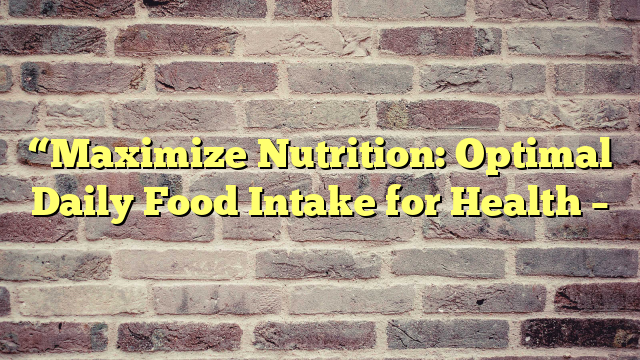Focus Keyword: optimal daily food intake
Subheadings:
1. Understanding Optimal Daily Food Intake
2. The Importance of Balanced Nutrition
3. Essential Nutrients for a Healthy Diet
4. Calculating Your Optimal Daily Food Intake
5. Tips for Maximizing Nutrition in Your Meals
6. Common Misconceptions About Daily Food Intake
7. Maintaining a Healthy Diet for Long-Term Health
Understanding Optimal Daily Food Intake
Optimal daily food intake refers to the amount and type of food that an individual should consume on a daily basis to meet their body’s nutritional needs. It is a crucial aspect of maintaining good health and preventing chronic diseases. However, with the abundance of information available, it can be challenging to determine what constitutes an optimal daily food intake. In this article, we will explore the basics of optimal daily food intake and how it can help maximize nutrition for overall health.
The Importance of Balanced Nutrition
A balanced and varied diet is essential for optimal health. Our bodies require a diverse range of nutrients, including carbohydrates, proteins, fats, vitamins, and minerals, to function correctly. These nutrients work together to support various bodily functions, such as energy production, cell repair, and immune system maintenance. A deficiency in any of these nutrients can lead to adverse health outcomes, while an excess can also have negative effects. Therefore, it is crucial to maintain a balanced intake of essential nutrients to ensure optimal health.
Essential Nutrients for a Healthy Diet
Carbohydrates, proteins, and fats are the three macronutrients that provide the majority of the body’s energy needs. Carbohydrates are the main source of energy and are found in foods such as grains, fruits, and vegetables. Proteins are essential for building and repairing tissues and are found in foods like meat, fish, dairy, and legumes. Fats are also a vital source of energy and are found in foods such as oils, nuts, and avocados. In addition to these macronutrients, the body also requires micronutrients such as vitamins and minerals for optimal health. These are found in a variety of foods, including fruits, vegetables, whole grains, and lean protein sources.
Calculating Your Optimal Daily Food Intake
There is no one-size-fits-all approach when it comes to optimal daily food intake. The amount and type of food a person needs vary depending on factors such as age, gender, activity level, and overall health. The United States Department of Agriculture (USDA) has developed a set of dietary guidelines that recommend the number of servings of each food group an individual should consume daily. However, a more personalized approach to determining optimal daily food intake is to calculate one’s daily caloric needs based on factors such as age, weight, height, and activity level. Several online calculators can help individuals determine their daily caloric needs based on their goals, whether it is weight loss, maintenance, or gain.
Tips for Maximizing Nutrition in Your Meals
Once you have determined your optimal daily food intake, the next step is to ensure that your meals are packed with essential nutrients to maximize nutrition. Here are some tips to help you achieve this:
1. Fill half of your plate with fruits and vegetables: Fruits and vegetables are rich in vitamins, minerals, and fiber, making them essential for a balanced diet. Aim to incorporate a variety of colors to ensure you are getting a diverse range of nutrients.
2. Choose whole grains: Whole grains, such as brown rice, quinoa, and whole-wheat bread, are a great source of fiber, vitamins, and minerals. They are also less processed than refined grains and have been linked to a reduced risk of chronic diseases.
3. Opt for lean protein sources: Lean protein sources, such as chicken, fish, eggs, and legumes, are essential for muscle growth and repair. They are also lower in saturated fats and calories compared to red meat and processed meats.
4. Don’t forget about healthy fats: Healthy fats, such as those found in avocados, nuts, and olive oil, are an important part of a balanced diet. They can help improve heart health and keep you feeling full and satisfied.
5. Limit processed and high-sugar foods: Processed and high-sugar foods are often high in calories and low in nutrients. Consuming them in excess can lead to weight gain and increase the risk of chronic diseases.
Common Misconceptions About Daily Food Intake
There are many misconceptions about daily food intake that can hinder individuals from achieving optimal nutrition. Some common myths include:
1. Skipping meals can help with weight loss: Skipping meals can lead to overeating and a lack of essential nutrients, which can have negative impacts on overall health.
2. Eating fat makes you fat: While it is true that consuming excess calories from any source can lead to weight gain, healthy fats are essential for a balanced diet and

